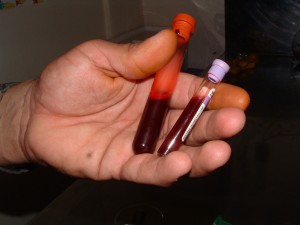Can the Police Make You Take A Blood Test After a DUI Arrest in Virginia?
April 27, 2016 by Jean Humbrecht
The simple answer is yes. Va. Code §18.2-268.2 requires drivers to submit to a breath or blood test after a DUI arrest in Virginia to determine their Blood Alcohol Content (BAC) or Blood Drug Content (BDC). If the BAC or BDC readings are at certain levels, the court can presume that a driver was under the influence of alcohol or drugs while driving. Results from breath and blood tests are commonly used as evidence against drivers charged with a DUI in Virginia. For more information on Blood Alcohol Content results in Virginia, click here.
Implied Consent
Drivers are required by the implied consent law in Virginia to submit to a breath or blood test after a DUI arrest (Va. Code §18.2-266), an arrest for Underage DUI (Va. Code §18.2-266.1), or after being arrested for Driving on a Revoked License (Va. Code §18.2-272(B)). For more information on Virginia’s implied consent law, click here.
When Is A Driver Required to Submit to A Blood Test in Virginia?


The police can require a driver to submit to a blood test after a DUI arrest in Virginia if:
- the driver is physically unable to take a breathalyzer test (Va. Code §18.2-268.2(B)),
- the breathalyzer test is unavailable (Va. Code §18.2-268.2(B)), or
- the officer suspects that the driver is under the influence of drugs instead of (or in addition to) alcohol (Va. Code §18.2-268.2(c)).
Refusal of Breath or Blood Test After A DUI Arrest in Virginia
If a driver refuses to take a breath or blood test after a DUI arrest in Virginia, he can be charged with refusal under Va. Code §18.2-268.3. Convictions for refusal result in automatic driver’s license suspension with no possibility of a restricted license. The driver could also face jail time and high fines for second and subsequent offenses within 10 years. For more information on refusal charges in Virginia, click here.
***DISCLAIMER: THE MATERIAL AND INFORMATION CONTAINED IN THIS POST, ON ANY PAGES ON THIS WEBSITE, AND ON ANY PAGES LINKED FROM THESE PAGES, ARE FOR GENERAL INFORMATION ONLY AND NOT LEGAL ADVICE. YOU SHOULD CONSULT A LICENSED ATTORNEY IN YOUR JURISDICTION BEFORE RELYING ON ANY OF THE INFORMATION CONTAINED ON THESE PAGES. SENDING EMAIL TO OR VIEWING INFORMATION FROM THIS WEBSITE DOES NOT CREATE AN ATTORNEY-CLIENT RELATIONSHIP***





